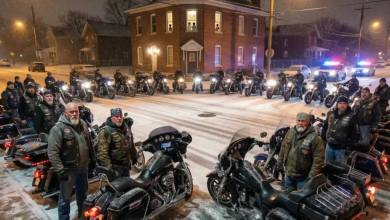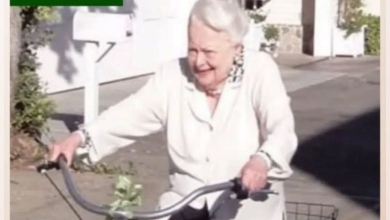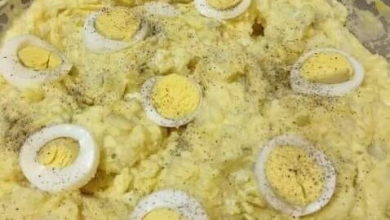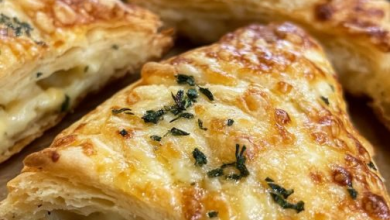Everyone Thought This Tattooed Biker Was A Predator Until The Cops Found His Reality..

Every Saturday, a fearsome-looking biker would meet a little girl at a McDonald’s—and one day, the manager finally called the police.
For half a year, the towering man in black leather, his arms covered in skull tattoos and his face marked by scars, showed up like clockwork. He always ordered two Happy Meals and sat in the same corner booth. Right at noon, a seven-year-old girl would come running through the doors and jump into his arms, calling him “Uncle Bear.”
To everyone else, he looked like trouble. Parents whispered. Some said it was “unnatural.” Others claimed the sight made them uneasy. When the complaints piled up, the manager did what he thought was right—he called the cops.
When the officers arrived the following Saturday, the entire restaurant fell quiet.
Lily, the little girl, saw them first. Her face drained of color.
She clutched the biker’s arm. “Are they taking you too? Like they took Daddy?”
The man—Bear, as she called him—rested his massive hand gently on her head. “Nobody’s taking me anywhere, sweetheart. We didn’t do anything wrong.”
But his eyes were alert. Watching. Calculating. Twenty years as a Marine and another fifteen riding with the Nomad Warriors MC had taught him to scan every room, every movement.
The lead officer approached cautiously. “Sir, we’ve had some reports—”
“I’ve got paperwork,” Bear said evenly. He moved slowly, taking out a wallet and handing over a laminated document.
The officer unfolded it, his expression shifting as he read.
It explained everything—why this intimidating biker and this small girl met here every week, why she called him Uncle Bear even though they weren’t blood, and why he’d fight anyone who tried to stop it.
“You’re her father’s friend from the Marines?” the officer asked.
Bear nodded. “We served three tours together. He saved my life twice. I saved his once. When he was dying inside, I made him a promise.”
The crowd leaned in to listen.
“Her dad didn’t die overseas?” one officer asked softly.
Bear’s jaw tightened. “No. That would’ve been simpler.”
Lily colored on her placemat, pretending not to hear, but her little shoulders were stiff.
“He came home broken,” Bear said quietly. “PTSD. Brain injury from an IED. He fought it for years. His wife left—took Lily with her. Couldn’t handle the outbursts, the fear. He tried to hold on, but eventually he… slipped.”
The officer looked down at the paper again. “It says he’s in prison.”
Bear nodded. “Robbed a bank. Gun wasn’t even loaded. Wanted to be caught. Thought Lily was better off without watching him fall apart. Fifteen years. Before they took him away, he made me swear I’d make sure she knew he never stopped loving her.”
“And her mother?”
“Remarried. New husband wants nothing to do with her old life. I’m allowed visitation—two hours a week, court ordered. McDonald’s was the only place she’d agree to.”
Across the restaurant, someone gasped softly.
Bear pulled out his phone, showing pictures: two Marines shoulder to shoulder in combat gear; the same man holding a newborn Lily; wedding photos, hospital photos, prison photos. Proof of a lifetime of loyalty.
“Every Saturday, I tell her stories about her dad—the good ones. The brave ones. The man he used to be before the war. I’m the only bridge she’s got to that version of him.”
Lily looked up from her crayons. “Uncle Bear was there when I was born,” she said proudly. “Daddy said he cried.”
“Did not,” Bear said, feigning gruffness. “Had dust in my eye.”
“You cried,” she giggled. “Daddy said you promised to protect me.”
The lead officer smiled faintly and handed the paper back. “Sir, we’re sorry for the misunderstanding. And thank you—for your service and for keeping your word.”
Bear stood, towering over everyone. “You want to know what’s dangerous?” he said, his deep voice filling the room. “Judging a man by how he looks instead of who he is. Calling the cops on a veteran because he’s having lunch with his best friend’s kid. That’s what’s dangerous.”
He pointed to the patches on his vest. “This one’s a Purple Heart. This one, a Bronze Star. This—her dad’s unit. And this little pink one?” He touched it gently. “That’s from Lily. Says ‘Best Uncle.’ That one’s worth the most.”
The manager shifted awkwardly. “Sir, I didn’t mean—”
“You did,” Bear interrupted, his tone firm but controlled. “And now everyone here knows things that should’ve stayed private—things a little girl shouldn’t have to hear.”
Lily pressed her face against his side. “They’re scared of you?” she asked softly.
He smiled sadly. “They just don’t understand yet, sweetheart.”
The next Saturday, Bear braced for the worst—canceled visits, more stares, maybe even refusal of service.
But when he walked in, the entire restaurant began to applaud.
Veterans from across town had gathered. The story had spread. Vietnam vets, Iraq vets, Gulf War vets—all in their own worn jackets and vests. They filled the booths, nodding in quiet solidarity.
When Lily arrived, she was greeted with smiles. The cashier handed her a drawing she’d made. The manager himself brought their food and apologized again.
“Uncle Bear,” Lily whispered, “why’s everyone so nice now?”
“Because now they see the truth,” he said. “Sometimes people just need help looking past the outside.”
An older woman approached, tears in her eyes. “I was one of the ones who complained,” she said. “My son came back from Iraq different. Angry. Covered in tattoos. I didn’t understand him. I pushed him away. He died alone. Watching you with her… I see the man he was before. I see the love I should’ve given.”
Lily climbed off the bench and hugged the woman tightly. “Your son was a hero,” she said softly. “Like my daddy. Like Uncle Bear. Sometimes heroes just forget for a while.”
The woman wept openly.
Bear’s phone buzzed. A message from Lily’s father through the prison system:
“Heard about what happened. Thanks for standing up for her—and for me. Seven years left, brother. Till then, you’re all she’s got. Love you both.”
Bear showed Lily the message. She traced the words with her tiny finger. “Daddy loves us,” she whispered.
“Always,” Bear said.
Their Saturdays went on. No more stares, no more whispers—just community. Veterans stopped by to chat. The cashier kept chocolate milk ready. The janitor always smiled when they came in.
Every week, Bear told a new story—how her father once carried civilians to safety under fire, how he’d sing to scared children, how he said Lily’s birth was his proudest moment.
“Will Daddy be different when he comes home?” Lily asked one day.
“Maybe,” Bear admitted. “But love doesn’t change. That’s what stays.”
“Like your promise to me?”
He smiled. “Exactly like that.”
She thought for a moment. “The kids at school say bikers are bad.”
“What do you think?”
She studied him—the patches, the calloused hands, the soft eyes. “I think people who judge without knowing are the bad ones,” she said. “You told me what matters is keeping promises and protecting people. That’s what bikers do. That’s what soldiers do. That’s what families do.”
Bear blinked hard, pride swelling in his chest. “That’s right, baby girl. You got it.”
Sunlight streamed through the windows, turning their corner booth into something almost holy. A huge, tattooed biker and a tiny little girl, sharing Happy Meals and holding on to each other like lifelines.
They had something stronger than appearances, stronger than judgment, stronger than distance or prison bars—something unbreakable.
Love. Loyalty. And a promise made to a dying brother.
“Uncle Bear?” Lily asked.
“Yeah, sweetheart?”
“You’ll never leave me, right? Even if they call the police again?”
Bear’s rough hand wrapped around her tiny one. “Wild horses couldn’t drag me away. Cops couldn’t keep me out. I’ll be right here, every Saturday.”
“Promise?”
He hooked his pinky around hers. “Promise.”
And everyone who’d heard their story knew that was a promise carved in stone.
Because that’s what real bikers do. What real soldiers do. What real families do.
They keep showing up.
Every Saturday.
Same corner booth.
Two Happy Meals.
Until her daddy comes home.
And long after, too.




